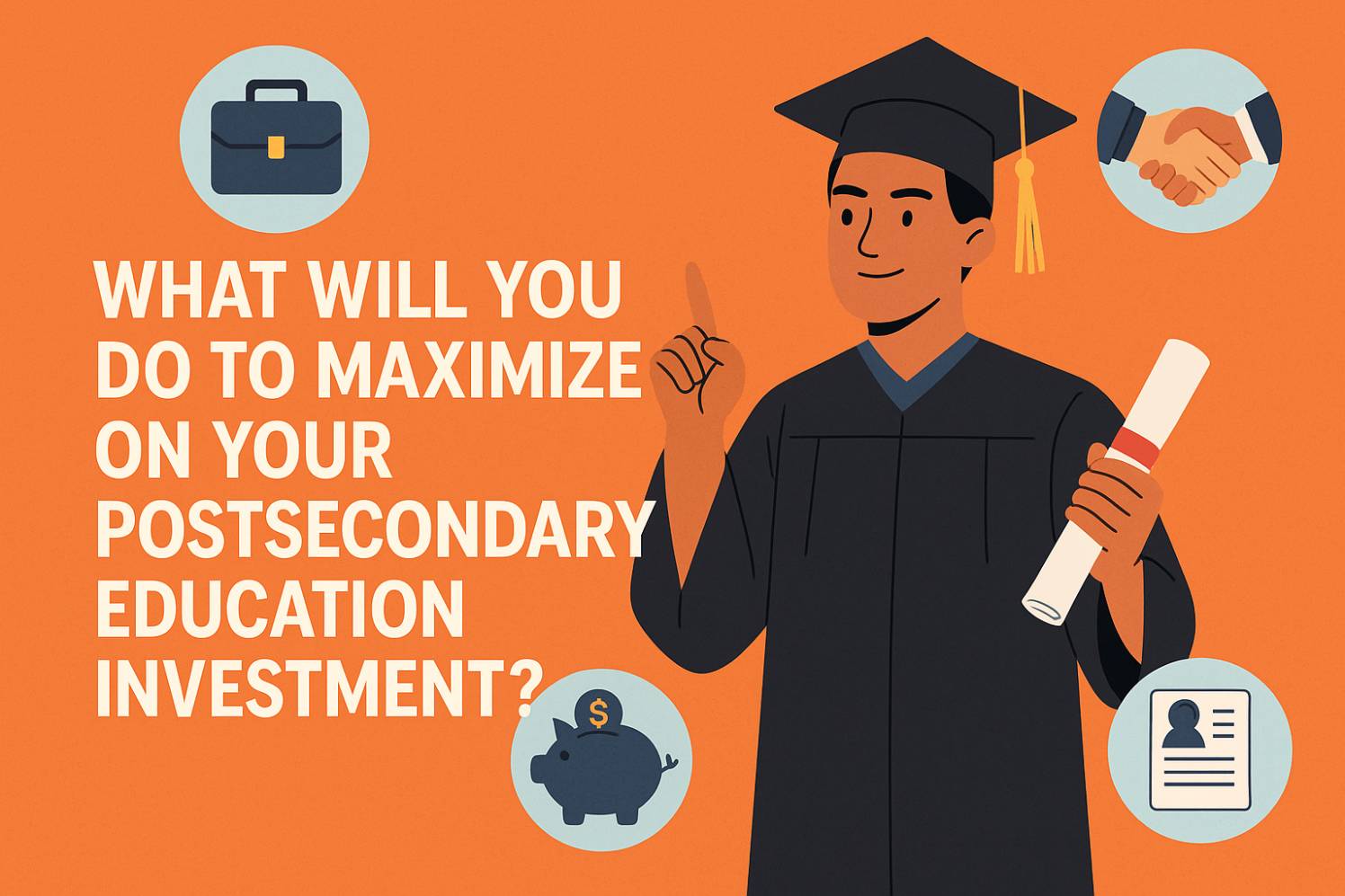Let’s get real: postsecondary education isn’t cheap. Whether you’re shelling out tens of thousands for a university degree or diving into a trade program, you want bang for your academic buck. So, the big question is: what will you do to maximize on your postsecondary education investment? The short answer? A whole lot more than just attending lectures and passing exams.
In this article, we’ll break down all the juicy tips, hacks, and high-ROI moves that will help you graduate not just smarter—but richer in experience, opportunity, and employability. Let’s turn your tuition into a power move.
1. Choose the Right Program Like Your Future Depends on It—Because It Does

Before you even step onto campus, ask yourself: What will you do to maximize on your postsecondary education investment? Well, it starts with choosing the right program.
- Market Demand Check: Research careers that are growing. Think AI, healthcare, green energy, digital marketing.
- Personal Passion Meets Paycheck: Find a sweet spot between what you love and what pays well. Liberal arts with a side of coding? Yes, please.
- ROI-Friendly Schools: Not all degrees are created equal. Community college + transfer = savings. Online degrees = flexibility.
Pro Tip: Use resources like the Bureau of Labor Statistics and College Scorecard to compare projected earnings and job placement rates.
2. Double Dip: Scholarships, Grants, and Free Money
Still wondering what will you do to maximize on your postsecondary education investment? Start by lowering the upfront cost.
- Scholarships Aren’t Just for Valedictorians: From taco lovers to left-handed bass players, there’s probably a scholarship for you.
- FAFSA Is Your BFF: Always fill out the FAFSA. Every. Single. Year.
- Work-Study Is Real Work Experience: And it pays. Cha-ching.
Pro Tip: Set calendar reminders for scholarship deadlines. Treat them like job interviews.
3. Build a Resume Before You Even Graduate
College is your career sandbox. Get dirty.
- Internships = Experience + Networking: Paid or unpaid, they show future employers you mean business.
- Freelance Projects or Side Hustles: Start a blog. Design logos. Tutor. Start showing your skills in action.
- On-Campus Leadership: Clubs, societies, and student councils scream initiative.
Still stuck on what will you do to maximize on your postsecondary education investment? Put “real-world prep” at the top of your priority list.
4. Network Like You’re on LinkedIn IRL

Your future job might come from someone you meet over bad pizza at a networking event.
- Talk to Professors (They Know People): Ask questions, attend office hours, join their research projects.
- Alumni Networks Are Goldmines: Graduates love to help students—especially if they liked the school.
- LinkedIn: Not Just for Boomers: Keep your profile updated. Follow industry leaders. Connect after job fairs.
Pro Tip: Treat every connection like a future job lead. Because it might be.
5. Don’t Just Learn—Master Soft Skills
Sure, your GPA is cute. But can you communicate, problem-solve, and lead?
- Public Speaking Skills: Join Toastmasters or take a speech class.
- Team Projects: Instead of groaning, see them as leadership training.
- Time Management: Use planners, apps, or old-school calendars to stay on top of life.
Remember: Employers often value soft skills more than technical ones.
6. Use Campus Resources Like They’re Free—Because They Are
- Career Center: Resume help, mock interviews, job postings.
- Tutoring Services: Struggling in a course? Don’t let your GPA suffer silently.
- Mental Health Support: Burnout isn’t productive. A strong mind = strong performance.
Still asking yourself, “What will you do to maximize on your postsecondary education investment?” Here’s a hint: use what you’re already paying for.
7. Graduate With a Plan, Not Just a Piece of Paper
Graduation day shouldn’t feel like a cliff.
- Senior Year = Job Hunt Bootcamp: Apply early. Tailor your resumes. Practice interviews.
- Certifications & Add-ons: Minor in something employable. Add a Google certificate. Show you’re up-to-date.
- Post-Grad Planning: Think grad school? Fellowship? Start-up? Plan it NOW.
8. Go Global (or at Least Off-Campus)
- Study Abroad: Looks great on a resume and changes your perspective.
- Exchange Programs: Save money, gain experience.
- Remote Learning: Supplement your program with free courses on Coursera or edX.
Pro Tip: Employers love global perspectives and adaptability.
9. Make Education a Launchpad, Not a Pit Stop

Education is an investment, but what you do with it matters more. Think beyond the classroom:
- Start Building a Portfolio: Whether you’re a writer, designer, coder, or scientist—start documenting your work.
- Track Your ROI: What’s the average salary for your major? Are you on track? Adjust accordingly.
- Financial Literacy: Understand loans, interest rates, and budgeting. Compound interest waits for no one.
10. Stay Curious, Stay Learning
Even after you graduate, learning doesn’t stop.
- Lifelong Learning: Keep up with trends in your field. Read. Take courses. Stay relevant.
- Professional Development: Attend seminars, join professional associations, go to conferences.
- Mentor and Be Mentored: Growth is a two-way street.
Your Tuition Deserves a Standing Ovation — Make Your Postsecondary Investment Clap Back!
You’ve got the brains. You’ve got the ambition. Now you’ve got the blueprint. The next time someone asks, “What will you do to maximize on your postsecondary education investment?”—you’ll have more answers than a finance professor on espresso.
Remember: your education is more than a bill or a diploma. It’s a launchpad. So network fiercely, hustle wisely, and graduate with more than just student loans. Go make your investment pay you back—with interest.







